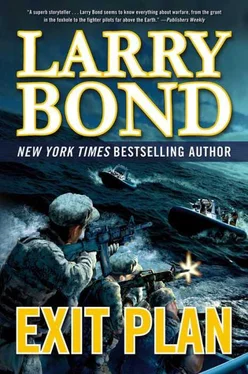Yazdi hesitated for a moment, looking to see if Moham would countermand Naseri’s orders. When the director just sat there, muttering to himself, the technician started the shutdown protocol. He kept up a running commentary on the centrifuge as he punched the commands.
“The temperature is spiking. Vibration readings are very high as well. Wait, now it’s gone to zero…
“Now it’s high again.” The technician checked the control settings. “It’s like the sensor can’t handle the data.”
“Never mind, Faraz, we don’t have time,” exclaimed Naseri. “That rotor will tear itself apart any second now. We have to leave.” She hit the red button on the console. The emergency alarm for the building started shrieking. Reaching down under her seat, she grabbed her gas mask from its storage bag and started putting it on.
The technician was busily putting on his mask, but Moham was fumbling with his, still confused as to what was going on. Naseri grabbed him and started pushing him to the exit.
The two of them managed to drag their supervisor out of the control room just as the centrifuge blew, a loud pop mixed with the screech of tearing metal. The blast-resistant windows shuddered, but held. The test cell was immediately filled with a brownish-yellow smoke. The swirling clouds near the ceiling also showed the fire suppression system had been activated, flooding the cell with carbon dioxide gas. Uranium hexafluoride could burn when mixed with the air.
A staccato of explosions punctuated by the sound of thuds and crashes continued, as if two giants were fighting in a junkyard. They felt each explosion through the floor, and they were hard enough to knock dust and debris down from the ceiling.
As Naseri and Yazdi made sure the control room door was latched shut, several men in firefighting gear came running down the hallway with hoses and portable extinguishers. Their leader pointed to the test team, motioning for them to move to a safer location. Escorted by two of the firefighters, Moham, Yazdi, and Naseri quickly found themselves outside; a crowd was gathering, with people streaming toward them from other buildings. The sound of sirens mixed with the diesel engines of fire equipment.
Colonel Zamanian, the base commander, leapt out of a jeep as it slowed.
“Davood! What happened? What went wrong?”
“Disaster!” wailed Moham. “May Allah be merciful!” The director began to weep, and would have collapsed if not for the firefighters supporting him on each side.
Zamanian turned to Naseri and Yazdi. “Engineer, Technician, tell me what happened.”
“A bearing failed on one of the centrifuges. It tore itself apart,” replied Naseri frankly. The engineer shuddered, reliving the experience. “There were many explosions, Colonel.”
Zamanian became pale. “Why? What caused the bearing to fail? I thought we solved that problem months ago.”
“I don’t know, sir. Nothing obvious. There was a temperature alarm in centrifuge forty-two and it blew up soon thereafter. We’ll have to analyze the test data.” She looked over to her partner. “But I believe Technician Yazdi was able to save the data. We should be able to identify the cause.”
“How much of the cascade did we lose?”
“I do not know,” answered Naseri, annoyed that the man seemed more interested in centrifuges than people. “But as I said, there were many explosions. It may be a total loss.”
Stunned, Zamanian nodded, then gathered himself. “I must report this unfortunate incident. The medical staff will tend to you and the others.” With a weary smile he added belatedly, “I’m glad that no one was hurt. We at least have that to be thankful for. Allah be praised.”
8 February 2013
Uranium Enrichment Facility, Natanz, Iran
Natanz lay only 150 kilometers to the north of his headquarters in Isfahan, so General Moradi had flown up early in the morning with his aide, Captain Hejazi. Moradi’s staff had urged him to wait, to not rush up there the same day, that afternoon. “They won’t know anything,” Colonel Nadali had warned. “They’ll bury you in raw data and argue with each other.”
The general had learned to listen to Farzad Nadali, his chief of staff. The colonel’s patience and good humor complemented Moradi’s own fiery temperament. Nadali had counseled Moradi to wait until the scientists had something to tell him.
So finally, two days later, they were flying north in an Islamic Revolutionary Guards Corps Mi-17. Instead of jump seats for troops, the Russian-made transport helicopter was fitted for VIP travel, with increased soundproofing, comfortable seating, and fold-down work surfaces. A few hundred meters below them, the landscape was empty and broken, painted in shades of brown and gray, with stony hills rising from the left. It was still winter, and the morning cold did nothing to soften the desert landscape.
Moradi had made the trip often, and hardly noticed the harsh beauty of the ground below. Instead, he studied a briefing prepared by the scientists and e-mailed to his headquarters that morning. The general was sure they’d been up all night working on it, but he was not sympathetic. A few more sleepless nights might have prevented this disaster.
Captain Hejazi’s voice interrupted his review. “Sir, Natanz is in sight.” Moradi understood that his aide was referring to the uranium enrichment facility. They’d spotted the town of Natanz proper five minutes ago. The facility was thirty kilometers farther to the north, surrounded by desert and rocky hills, but not isolated. Its front gate was just south of the Isfahan-Kashan road, a six-lane highway that actually passed through the outer ring of air defenses. A moment later the aide added, “Major Sadi is monitoring our approach.”
Moradi nodded, acknowledging the report. Sadi was in charge of the facility’s air defenses, and simply because they were a scheduled flight didn’t mean they couldn’t be shot out of the sky.
The enrichment site itself was a rough square, a kilometer and a half on each side. A perimeter fence enclosed the pilot enrichment plant, the gigantic buried centrifuge halls, and the support buildings for those two vital facilities.
A few hundred meters out, a road paralleled the perimeter, connecting dozens of antiaircraft gun emplacements and watchtowers. Each gun position, a pair of manually aimed 23mm or 35mm autocannons, was ringed with sandbags and sited on an earthen mound to give it a better field of fire.
Farther out, a second ring bristled with even more guns: larger four-gun batteries of 100mm weapons, radar-directed 35mm batteries, scores of the manually aimed guns, and half a dozen batteries of surface-to-air missiles. Three early warning radars covered Natanz and the surrounding area. It was possible that Natanz was the most heavily defended place in Iran, except, of course, for Tehran itself.
And a lot of that was Moradi’s doing. Since he’d been placed in charge of the nuclear weapons program five years ago, he’d tripled the number of SAM batteries and ordered a second ring of antiaircraft guns placed around Natanz. He’d also handpicked Sadi for his post. The major was inexperienced, but competent, hardworking — and loyal.
Moradi felt the helicopter descend, and he saved his notes and closed the laptop. As Hejazi packed up the general’s computer, the helicopter hovered and then set down smoothly. The crew chief moved aft to open the side door, and Moradi remembered to remove his uniform cap before the rotor wash snatched it away.
The blades slowed, and figures outside ran toward the open door. A few were ground crew, but most were officers, with a few civilians scattered through the group. Moradi recognized the Natanz facility’s commander, Colonel Zamanian, with his staff, including Sadi, and Nadali, who’d arrived yesterday to manage the recovery and the investigation. Colonel Nadali was a great organizer, and he’d been right to go ahead and manage things. Moradi knew he’d probably have fired the lot on the spot.
Читать дальше












